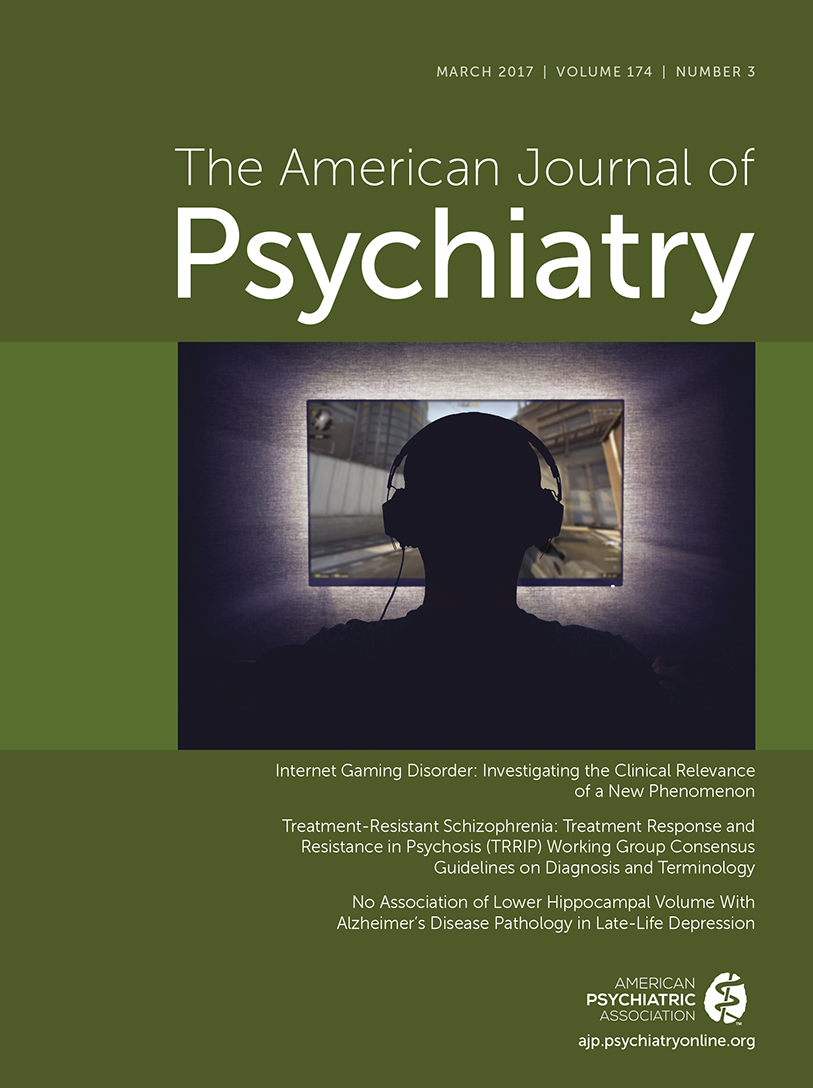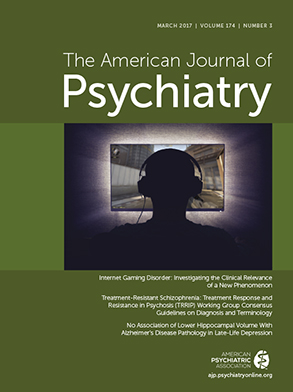Depression is one of the most common complications of pregnancy (
1,
2). For the past few years, the topic of mood and anxiety disorders during pregnancy and the postpartum period (the perinatal period) and their effects on both maternal and child health have become increasingly visible in the clinical, research, and policy realms. The recommendation by the U.S. Preventive Services Task Force (
3) in 2016 to screen all adults, including pregnant and postpartum women, for depression has been endorsed by numerous organizations, colleges, and societies made up of interdisciplinary teams from both obstetric and psychiatric backgrounds (
3).
Mental disorders negatively affect not only the mother but also her child(ren) and family (
4). According to a recent study in the United Kingdom (
5), psychiatric disorders are associated with an elevated risk of maternal mortality from suicide, which was responsible for 20% of deaths during pregnancy or the first year postpartum. An American study from Colorado (
6) found that deaths related to psychiatric disease were the eighth most common cause of maternal death, more common than hemorrhage or complications of anesthesia (
5), and when combined with drug overdose and categorized as “self-harm,” they were the leading cause of maternal mortality.
The risks of untreated depression during pregnancy include premature birth (
7); infants with low birth weight (
8); increased use of tobacco, alcohol, and illicit drugs (
9); and poorer overall maternal health. These adversities contribute to higher disease risk in the mother (
10) and in her child throughout the life course (
11). While we recognize that psychiatric disorders are complex biological, familial, and societal illnesses, recent research has established that one origin of these disorders is during fetal development. Even subtle problems in fetal brain development can predispose the child to mental illness in adulthood (
4,
12,
13). Thus, the quality of the fetal environment during sensitive periods can dictate the vulnerability of individuals to a broad array of diseases across the lifespan (
14). Fetal programming is widely accepted as part of the inheritance of obesity, metabolic disease, and diabetes (
15). Similarly, fetal programming of psychiatric disorders is an emerging domain of robust research (
14,
16,
17). Therefore, investigators and clinicians support treating depression during pregnancy to mitigate depression’s effects on both the mother and her child. For example, exposure to depression during the fetal period has been shown to increase the risk for depression in offspring at age 16 by 4.7 times compared with unexposed offspring, even when the mother recovered from depression after birth (
18). The relationship between maternal depression and child developmental adversity is a continuum that begins during pregnancy.
In response to the recommendations from the U.S. Preventive Services Task Force (
3), the American College of Obstetricians and Gynecologists (
19), and the American Academy of Pediatrics (
20) to screen for depression during the perinatal period, the Council on Patient Safety in Women’s Health Care (
www.safehealthcareforeverywoman.org) assembled a workgroup to create a patient safety bundle on maternal depression and anxiety. The Council on Patient Safety in Women’s Health Care comprises a consortium of organizations across women’s health with the goal of promoting optimal care for women with conditions associated with the highest maternal morbidity and mortality. The council aims to standardize health care processes to improve outcomes and quality of care through the dissemination of patient safety bundles that reflect emerging clinical, scientific, and safety advances that may be adapted to local resources. The patient safety bundles provide consensus and direction on the management of leading causes of maternal mortality, such as postpartum hemorrhage, gestational hypertension, and venous thromboembolism. The council acknowledged that mental health is a critical element in maternal safety and that optimizing mental health during the perinatal period will reduce morbidity and mortality. The workgroup was composed of representatives from the obstetric, nursing, midwifery, psychiatric, social work, and advocacy communities. A commentary outlining the safety bundle and related actionable practices that should be put into place in all clinical settings that care for pregnant women was published in this month’s issue of
Obstetrics & Gynecology (
21).
The commentary encourages clinicians treating pregnant women to apply the safety bundle framework consisting of “readiness, recognition and prevention, response, and reporting/systems learning” to universal screening, assessment, treatment, and care coordination of women throughout the perinatal period. The readiness portion of the bundle is adaptable to every clinical care setting and encourages perinatal care providers to use mental health screening tools routinely and to integrate screening into routine prenatal and postpartum care. Readiness also applies to the establishment of a practice-based response that incorporates local (or online) resources and to the identification of a practice champion who is responsible for driving the routine screening and response protocol as part of routine perinatal care.
The recognition and prevention section advocates that every woman have an individual and family mental health history taken as an integral part of her medical history at the time of the initial prenatal care visit. This history should include past and current psychiatric treatments and their effectiveness, routine depression screening, a discussion about risks to both the mother and child of untreated mental illness during the perinatal period, and monitoring throughout pregnancy and the postpartum period. This section of the safety bundle also promotes the provision of information to all pregnant and postpartum women, their partners, and other family members about the prevalence and symptoms of perinatal mood disorders and about community (or national) resources that exist even for women who screen negative.
The section on response to every identified positive screen includes initiation of a stepped care response protocol based on severity criteria, activation of an emergency referral protocol for suicidal or homicidal ideation or psychosis, the recruitment of support for the woman as well as for her family and clinical staff, and a process to obtain follow-up on women referred for a higher level of treatment. The response category of the bundle is the section in which the coordination of care between obstetrics and psychiatry is most critical and where improvement in interdisciplinary collaborations in all clinical settings is most pertinent to the psychiatric community. As discussed in the Commentary by Osborne et al. in the October 2015 issue of the
Journal (
22), the working group acknowledged that clinical demand exceeds the existing number and geographic distribution of reproductive psychiatrists. The working group also observed that the capacity for interdisciplinary collaboration varies widely throughout the United States and encouraged obstetric practitioners to engage psychiatrists on guidance and care coordination, including transfer to an emergency or inpatient psychiatric unit. This section of the safety bundle requires the most outreach and communication from the psychiatric community and serves as a clear example of how the “dearth of reproductive mental health education has had problematic consequences for women” and their children (
22).
Few states have systems in place to support such interdisciplinary communication at present. However, the Massachusetts Child Psychiatry Access Project for Moms is a leading example of this type of collaborative care model (
23). Collaborative care for socioeconomically disadvantaged depressed pregnant women results in significant improvement in quality of care, depression severity, and remission rates compared with women receiving standard maternity support services (
24). The workgroup also acknowledged the dearth of inpatient psychiatric units equipped to manage perinatal patients and to keep these women with their infants, as in mother-baby joint admission units found in other countries such as the United Kingdom, France, and Australia.
Finally, the reporting/systems learning domain calls for the establishment of a “nonjudgmental culture of safety through multidisciplinary mental health rounds”; multidisciplinary review of adverse perinatal mental health events or outcomes; and other measures of safety, compliance, and outcomes to improve the process at the local level in a manner that suits the practice and clinical setting. This section, as well as the entire bundle, advocates for reduction of silos in health care and improved communication and collaboration to improve the routine care of perinatal patients and to improve health care efficiency by encouraging integration of behavioral health care into primary care settings. Increasing the number of psychiatrists trained in perinatal mental health is needed to meet the goals of collaborative mental health care in women’s health practices (
22). This is a call to action for both the obstetric and psychiatric communities.
While the safety bundle is most applicable to those who interact daily with pregnant and postpartum women (obstetricians, midwives, and primary care providers), comprehensive care for women with depression and other mental disorders must include psychiatrists for consultation, treatment of complex cases, emergency psychiatric management, and longer-term care and preventive interventions beyond the perinatal period. The opportunity for psychiatrists to engage in collaborative care to improve the health of childbearing women, their families, and the next generation is compelling. Work with our obstetric colleagues toward interventions to promote multigenerational improvement in the short- and long-term mental health of our society is high impact and has potential to both mitigate mental diseases for the mother and prevent them in future generations.

